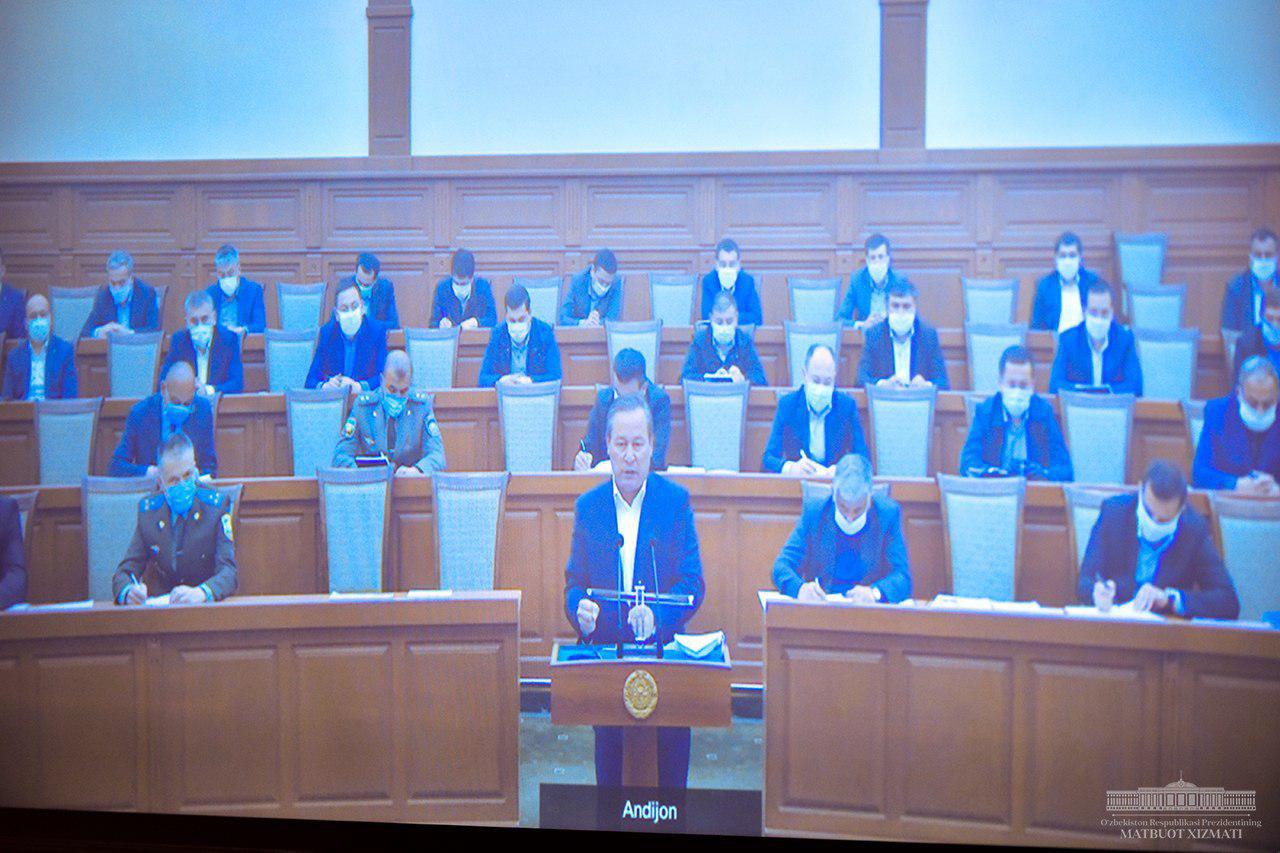
The Government portal of the
Republic of Uzbekistan
Manufacturing agricultural and food products – the most pressing issue
2020-04-11 | Politics
On April 10, President of the Republic of Uzbekistan Shavkat Mirziyoyev chaired a videoconference on development of a cluster system in cotton and grain growing, the effective organization of spring agricultural activities, and increasing yields.

It is now becoming apparent that the coronavirus pandemic, along with the threat to human life, is increasingly moving the world closer to the brink of an economic abyss. According to forecasts of international organizations, the economic damage from a pandemic will be at least 5 trillion USD.
In particular, a two-fold reduction in revenue is expected in international tourism, transport and logistics. A large decline is predicted in many industries due to destruction of production chains.
In this situation, the issue of food supply is aggravated, some countries impose bans on food exports. Therefore, agriculture and food production are becoming the most pressing issue today.
Yesterday, the World Bank in its report noted that agriculture will be the main source of economic growth in European and Central Asian countries, paying special attention to Uzbekistan’s great potential in this area.
At the meeting, the Head of the state noted that from now on all khokims, sector leaders must mobilize reserves in the agricultural sector and increase production. This is the only way to partially compensate for losses in other sectors of the economy, to ensure employment and incomes of the population.
As is known, large-scale and serious reforms in agriculture are being implemented in the country. In particular, the state order for cotton and grain was canceled, and pricing was liberalized. Transition to a cluster production system has been completed and all conditions for clusters have been created. The goal is to significantly increase production, create high added value and new jobs, and most importantly, increase income and interest.
Clusters are introducing innovative ideas and saving technologies in agriculture, providing economic efficiency.
For example, last year, the TST cluster in Kuyichirchik district, Sangzor Textile cluster in Dustlik district received an average of 30-36 centners of cotton per hectare and doubled their yield compared to the last year. The Khanteks cluster in Kurgantepa district, where the drip irrigation system was introduced, received an average of 70 centners from each hectare of cotton fields.
These results clearly indicate that there are large reserves in cotton growing. It was noted that clusters should fully use their capabilities and contribute to socio-economic development of their district and change people’s mindsets and lifestyles in a positive way.
All necessary conditions are created for this. In accordance with the adopted decrees to mitigate the consequences of a pandemic, the term for repayment of loans by clusters has been extended. A number of tax preferences have been introduced for them.
Cluster leaders, who appreciated the support provided, took the initiative to increase the yield of cotton by 10 centners and grain by 20 centners.
The President noted that all managers and farmers in the current difficult conditions should unite and work on increasing the procurement of products.
In order to coordinate the activities of clusters, the widespread adoption of advanced techniques, an initiative was approved to organize an Association of clusters producing and processing cotton.
According to experts, this year there will be a serious shortage of water. Therefore, it is extremely important to save water resources and take measures to halve its consumption.
The Ministry of Water Resources was instructed to ensure the release of this vital resource on the basis of accurate calculations, to introduce water-saving technologies on 150 thousand hectares of fields this year, including drip irrigation on 44 thousand hectares.
At the videoconference, measures in grain industry were also discussed.
As a result of the pandemic over the past three months, the volume of flour imports into the country decreased by almost 50 percent, grain – by 31 percent compared to the same period last year. Current epidemiological situation requires us to be fully prepared for any situation, to create sufficient food reserves to meet the needs of the population.
Stable prices remain in the domestic market due to the increase in government procurement prices for grain last year, as a result of which the interest of dehkans increased and more wheat was harvested.
And in this season, it is necessary to carry out additional agrotechnical measures, increase the yield of wheat by 20 centners and take measures to obtain at least 70 centners of yield from each hectare.
To do this, it is important to develop scientifically based recommendations for each region and district, using them – correctly organize agricultural activities. Issues of wheat feed, chemical treatment of plants against rust, pests and weeds, and organized harvesting were also considered.
It would be very appropriate if the 102 grain clusters organized this year set a good example for farmers and offer meat, fish and poultry products at affordable prices due to surplus crops.
During a pandemic, all states take serious measures to prevent food shortages. In May-December last year, 116 thousand tons of sunflower seeds, 7 thousand tons of soy, 15 thousand tons of rice, 2.6 thousand tons of cereals were imported into the country.
This means the need for more serious work to expand the range and increase food production. We should not only replace imports, but also enter new export markets. Only in this way we can emerge from the global crisis as a strong country.
To increase the harvest of agricultural products, it was instructed to plant potatoes, carrots, onions, garlic, lettuce, peas, mung bean, beans, tomatoes, cucumbers, bell peppers, gourds between rows of new orchards with an area of 10 thousand hectares and vineyards with an area of 9 thousand hectares.
Hundreds of wells were built, vineyards on rainfed lands of 10 thousand hectares were created in Bakhmal, Yangiabad, Farish and Kushrabat districts. It was noted that it is necessary to disseminate this experience in all regions, to deliver drilling equipment to rainfed areas.
It was noted that all sector leaders should keep records of food supplies on their territory and expand internal capabilities.
Responsible persons of the sphere, khokims of regions and heads of clusters provided information on what organizational measures will be taken to fulfill the tasks set at the meeting.

Source: UzA









